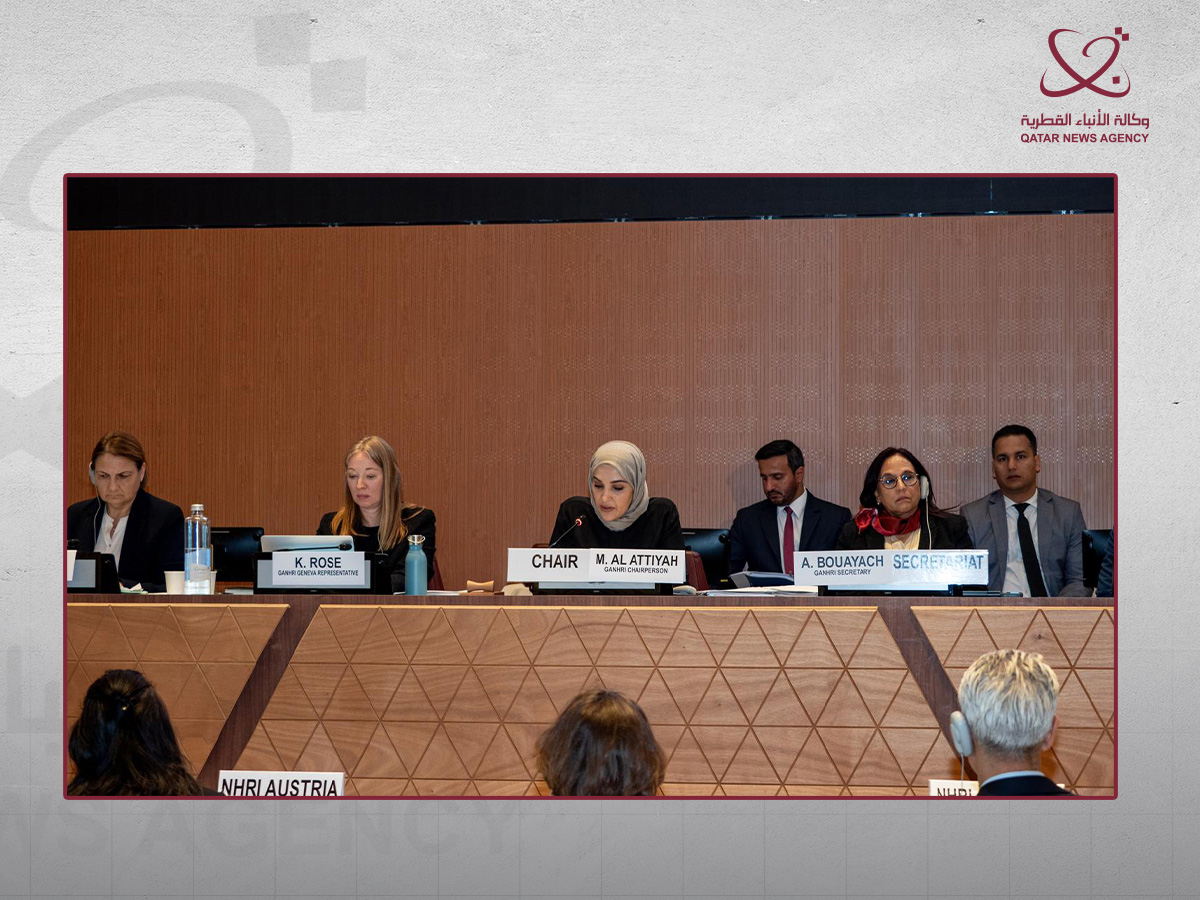GANHRI President: Dangerous Challenges Faces Humanitarian Institutions Worldwide

Geneva, March 13 (QNA) - President of the Global Alliance of National Human Rights Institutions (GANHRI) and Chairperson of the National Human Rights Committee (NHRC) Maryam bint Abdullah Al Attiyah underscored the serious challenges facing national human rights institutions worldwide.
She noted that the Global Alliance of National Human Rights Institutions conducted a survey last year, revealing grave threats against staff of these institutions and human rights defenders.
In her speech during the opening of the GANHRI General Assembly at the United Nations Office in Geneva, she referred to a survey conducted by GANHRI last year, which revealed that many staff members of these institutions and human rights defenders have experienced alarming threats. Al Attiyah explained that, according to the survey, national institutions reported numerous violations against human rights defenders and their own employees, such as arbitrary arrest, detention, prosecution, campaigns of harassment, intimidation, defamation, kidnappings, and threats of physical harm. They also pointed out that freedom of expression had been restricted, budgets reduced, and certain restrictive laws introduced. In addition, these institutions were subject to intimidation and acts of retaliation tied to their cooperation with the United Nations or regional human rights mechanisms.
She indicated that GANHRI’s report on reprisals contains a set of recommendations to address these threats, including capacity-building for staff of national human rights institutions and human rights defenders, enhancing regional and international cooperation to share best practices, and forming strategic partnerships with human rights partners.
She called for concrete ways to provide support and protection for members of national human rights institutions at all levels. Al Attiyah emphasized that strengthening partnerships and cooperation is crucial for safeguarding these institutions so that they can effectively defend human rights, explaining that such institutions need robust support and protection to maintain their independence and cannot fulfill their role single-handedly.
She added that GANHRI has enhanced its engagement with UN bodies to support the implementation of the Kyiv-Copenhagen Declaration, and to strengthen the role of national human rights institutions in preventing and combating torture and ill-treatment. This has included holding a meeting with the Committee Against Torture and the Subcommittee on Prevention of Torture, as well as forming a partnership with the Association for the Prevention of Torture to organize a six-part webinar series, launched last October with the participation of more than 100 representatives from national human rights institutions in all regions.
She stressed that the time has come to continue explicit advocacy for the absolute prohibition of torture at all times and in all places.
Turning to women’s rights and the rights of persons with disabilities, she observed that, despite some noticeable progress in certain fields and three decades after the global commitments on women’s rights outlined in the Beijing Declaration, women in most regions of the world are still more likely than men to live in poverty. She also pointed out the alarming prevalence of gender-based violence, including domestic abuse, emphasizing that the justice and compensation available to victims remain sadly insufficient, which stands in stark contrast to the principle that all human beings are born free and equal.
She noted that the annual GANHRI conference provides an opportunity to discuss the experiences of national human rights institutions, identify best practices, and agree on a strong outcome statement to move toward a better future.
Al Attiyah noted that GANHRI’s annual conference presents an opportunity to discuss the experiences of national human rights institutions, identify good practices, and agree on a strong outcome statement as a step toward a better future.
She added that persons with disabilities remain among the groups most vulnerable to marginalization and exclusion, even though the UN Convention on the Rights of Persons with Disabilities was adopted nearly twenty years ago. According to her, many national human rights institutions have chosen to prioritize the rights of women and persons with disabilities in their work.
Al Attiyah went on to say that national human rights institutions often serve as a vital refuge for many individuals seeking support and protection. She pointed out that GANHRI aims to empower, support, and shield these institutions so they can function effectively in accordance with the Paris Principles and contribute to collective global advocacy for human rights.
She also remarked that wars and conflicts inflict catastrophic damage on societies, families, and individuals, depriving them of their rights, freedoms, and hope. This is where national human rights institutions play a key role by assisting victims, defending their rights, and monitoring as well as reporting violations.
She also noted that in some countries, political leaders seek to exploit widespread societal anxiety and fear often rooted in economic insecurity and rising costs of housing, healthcare, and education to fuel internal conflicts, turn communities against each other, and sow seeds of hatred among people.
In facing these challenges, President of GANHRI sad that national human rights institutions play an important role in combatting bias, discrimination, and misinformation through evidence-based advocacy and education. She commended the diligent efforts of GANHRI’s regional networks to produce resources that meet the needs and priorities of national human rights institutions. (QNA)





